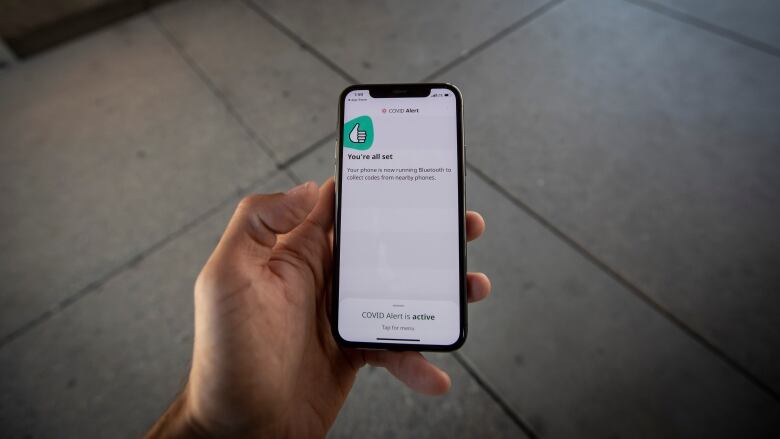Federal COVID Alert app to collect more data to gauge effectiveness
Government says app will maintain 'strong privacy measures'

Hailed by the federal government as a key tool in the fight against the coronavirus since its release last July, Canada's COVID Alert app has been plagued by a nagging question: Does it really work?
Now, federal officials have a plan to offer a better answer soon. It will require collecting more data on how the app is used, but the government says it will still respect users' privacy.
Employing wirelessBluetooth technology, COVID Alert was designed to tell users when they've been in close contact with someone who later tested positive. Built-in privacy features have made it impossible to pinpoint where the contact occurred, or with whom.
The federal ministers of health and digital government announced in a statement Tuesday afternoon the app "will be updated to help measure its uptake, performance and effectiveness in limiting the spread of COVID-19."
Until now, observers have found it hard to gauge its usefulness, with no way of knowing how many users have been notified of potential exposure. The app's development team has stressed the data hasn't been available, as much of the information related to close contacts is stored on individual smartphones, rather than on a central server.
"It's problematic to adopt and launch a technology and to have no way of assessing whether the technology is actually useful," said Teresa Scassa, a law professor at the University of Ottawa.
Scassa said she had no immediate concerns about the data collection.The government's news release says the update will maintain "strong privacy measures" to preserveconfidentiality.
"I'm encouraged that now they're starting to collect metrics," said Scassa, who holds the Canada Research Chair in Information Law and Policy.
The app has been reconfigured to send a package of additional data to a central server every day, according to an official with the developer,Canadian Digital Service (CDS). The officialsaid the information would not be attached to personal identifying information or a user's IP address, which will also be sent to the server.
A tweet from CDSsaid users would receive a push notification when the app starts collecting the data. Users cannot opt out of the update.
Starting today, people with #COVIDAlert will see a notification letting them know that the app will start collecting metrics.
Read on to learn more. pic.twitter.com/dzDLlvCGJJ
—@CDS_GCAccording to a government news release, the app will collect data on:
- The number of active users and downloads per province or territory.
- The number of exposure notifications sent.
- How many users enter a one-time key after receiving a diagnosis.
- Technical performance to help ensure it's working correctly.
The office of privacy commissioner Daniel Therrien wasconsulted on the new data collection and a spokesperson said the team was satisfied with the safeguards.
"Health Canada has put in place strong privacy measures to limit the risk of re-identification,"Tobi Cohen, the representative for the privacy commissioner's office, said in an email.
The government says the data will start being collected over the next two weeks, with statistics first published online sometime in the spring.
COVID Alert has been downloaded more than 6.1 million times, but it's unclear how many Canadians have then finished the installation process on their smartphones and kept the app active. After glitches recently prevented the app from delivering exposure notifications, the CDS recommends users regularly open COVID Alert to ensure it's still working.
Figures from Ontario show the vast majority of COVID-19 cases diagnosed in the province are not reported through the app. Last Friday, for instance, Ontario recorded 1,670 new cases while only 49 people used the app to notify close contacts of potential exposure.
Across Atlantic Canada and the Northwest Territories, only 82 users had used the app to report a positive test result, N.B. officials said last month. The app is functional everywhere in the country except for Alberta, B.C., Nunavut and Yukon.













_(720p).jpg)


 OFFICIAL HD MUSIC VIDEO.jpg)
.jpg)



























































































